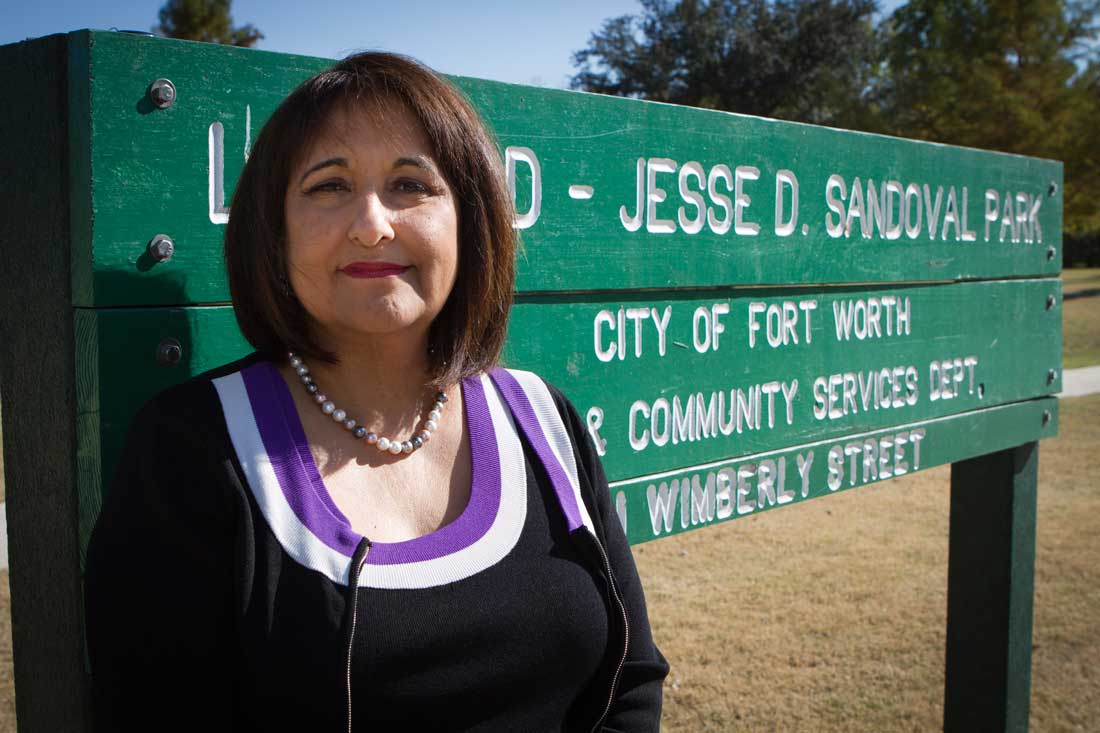The latest evidence of pressure on Fort Worth’s Linwood enclave is a project that will cast a long shadow on the park named for a man who fought to preserve the modest but tight-knit neighborhood through floods, a major tornado, and — most recently — the incursions of developers.
The Fort Worth Zoning Commission recently approved zoning for a four-story apartment complex with a parking garage. The 384-unit project will cover five acres now occupied by a set of rental duplexes plus vacant lots.
Some longtime residents are unhappy about the decision but feel they have won as many concessions as they could in the zoning process. And some of them are also unhappy with what they see as a lack of help from their Fort Worth City Council representative, Joel Burns.
Linwood is made up of one-story homes and duplexes, and developers of the West 7th corridor have been trying to buy land there for years.
Eva Bonilla, secretary of the Linwood Neighborhood Association and a past president of the Fort Worth League of Neighborhood Associations, said any structure taller than three stories violates the comprehensive plan for the area. The nearby streets “can’t handle that much traffic,” she said.
One of the two development companies involved, Powers & Curtis Real Estate Development & Brokerage, is known as a luxury real estate development company — and luxury’s not a word usually associated with the area of small homes just west of Montgomery Plaza.
Bonilla was born and raised in Linwood. Her father, Jesse Sandoval, a longtime neighborhood association president, encouraged her to help preserve the neighborhood and its history. After he died in 2010, Linwood’s park was renamed in his honor.
Bonilla is planning to build a home in Linwood on a lot she recently purchased on Foch Street. The property backs up to Jesse D. Sandoval Park. Now, she said she doesn’t know if she wants to build because the apartments would be so close.
“They keep on trying to take away the character and history,” she said. “They’re tearing it apart.”
“They” are real estate developers, the main threat for long-time Linwood residents like Bonilla and Mary Byrd, a tax accountant who has lived in her duplex on Merrimac Street for decades.
At a Nov. 14 hearing, the zoning commission took a compromise route between the developers and the neighborhood.
Bonilla and the neighborhood group asked that the project be limited to three stories. Developers asked for five, and the commission approved it for four.
Developers agreed to the neighborhood’s request that construction activity be limited to weekdays between 7 a.m. and 7 p.m. In addition, construction traffic will be confined to certain streets and won’t take up on-street parking.
“We’ve fought developers and fought them, and we feel like we’re fighting a losing battle,” Byrd, 84, said. “None of us want this type of development. Most of us really love our homes.”
A majority of neighborhood association members eventually voted to support the zoning change, Bonilla said, but only because they were overwhelmed by the bargaining process.
“They were angry they had to give in because they felt they were backed into a corner,” she said.
That frustration intensified on the day of the hearing, she said — the case was the 16th and final one heard on that day, by which time several neighborhood leaders had had to leave to go take care of children who were getting home from school.
In the past, Bonilla said, the developers were pressuring individual homeowners to sell. But Powers & Curtis bought most of the land for the apartments from one absentee owner.
The second development partner in the project is TownSite Co., where Phillip Poole is a lead development executive.
Poole said the land on which Linwood sits is valuable for developers due to its proximity to the West 7th corridor. “It’s hard to make a single-family house work on expensive land,” he said.
Linwood’s single-family homes aren’t benefiting the area as much as development could, Poole said. “Most of those houses are 50 years old, and they’ve reached [the end of] their useful life.”
That’s news to residents who still take pride in those homes, Bonilla said.
She said Poole’s approach served as a barrier during negotiations. “It’s all about the buck, if you ask me,” she said.
Poole said developers worked with Burns to address the neighborhood’s needs. Bonilla and Byrd don’t see it that way.
Burns declined through a city spokesperson to be interviewed for this story.
According to Bonilla, when the neighborhood group met with Burns and State Rep. Lon Burnam on Oct. 29, Burns played a neutral role but also described a five-story project as acceptable, as long as it was far enough away from the single-story houses.
Part of the project will be across the street from such homes.
Afterward, Bonilla said, neighborhood association members tried repeatedly to contact Burns but got no reply until the day of the hearing, when it was too late.
“We figured we didn’t have the support we needed,” she said. “So many older people in the neighborhood are afraid because they know this is their home and their castle,” she said.
The apartment developers won’t be pushing anyone out, Poole said. “These [properties] are all owned by P&C, so there’s no more pushing people out or strong-arming. If there is, it’s not being done by P&C.”
Bonilla said she still worries about the hike in property taxes.
“The people that are there, their real estate taxes have gone up 10 percent,” she said. “There isn’t a cap on those taxes.”
Chris Powers, a principal development broker from Powers & Curtis who is managing the apartment project, said negotiations went on for six months and that the residents had chances to air their views. Developers and neighbors agreed on 14 of 15 issues, he said, the 15th being the number of floors in the project.
Bonilla said Powers first described the project as including 100 units but changed it to 384 at an Oct. 16 meeting.
Poole and Powers emphasized that the parking garage would serve only the development’s tenants and their visitors and that customers at nearby businesses would not be able to park there.
Other developers are still offering homeowners in Linwood — many of whom are elderly — between $100,000 and $150,000 for their property, Bonilla said. That’s not enough to enable residents to start over and find comparable homes elsewhere, she said.
Byrd said she’s not against all development but that the apartments will bring in many more short-term residents. Regardless of the zoning commission’s decision, Byrd said, she will oppose this type of development, especially since this one will crowd her one-story house with four-story structures on two sides.
“As long as I’m alive, I will fight them,” she said.












